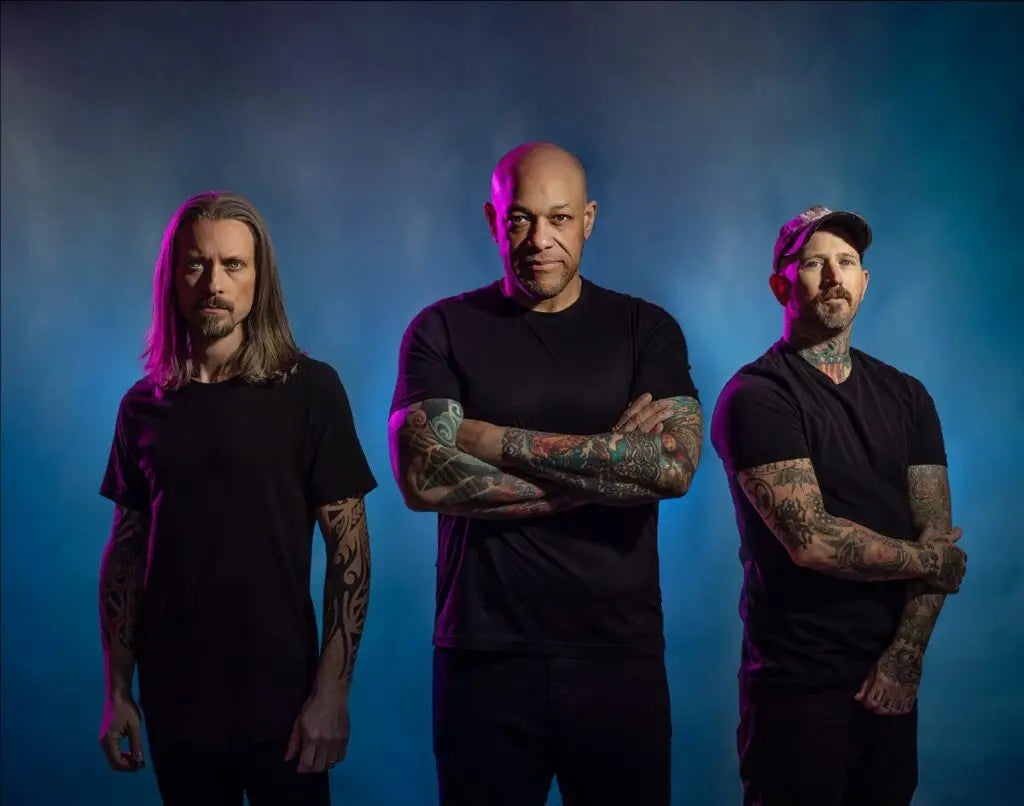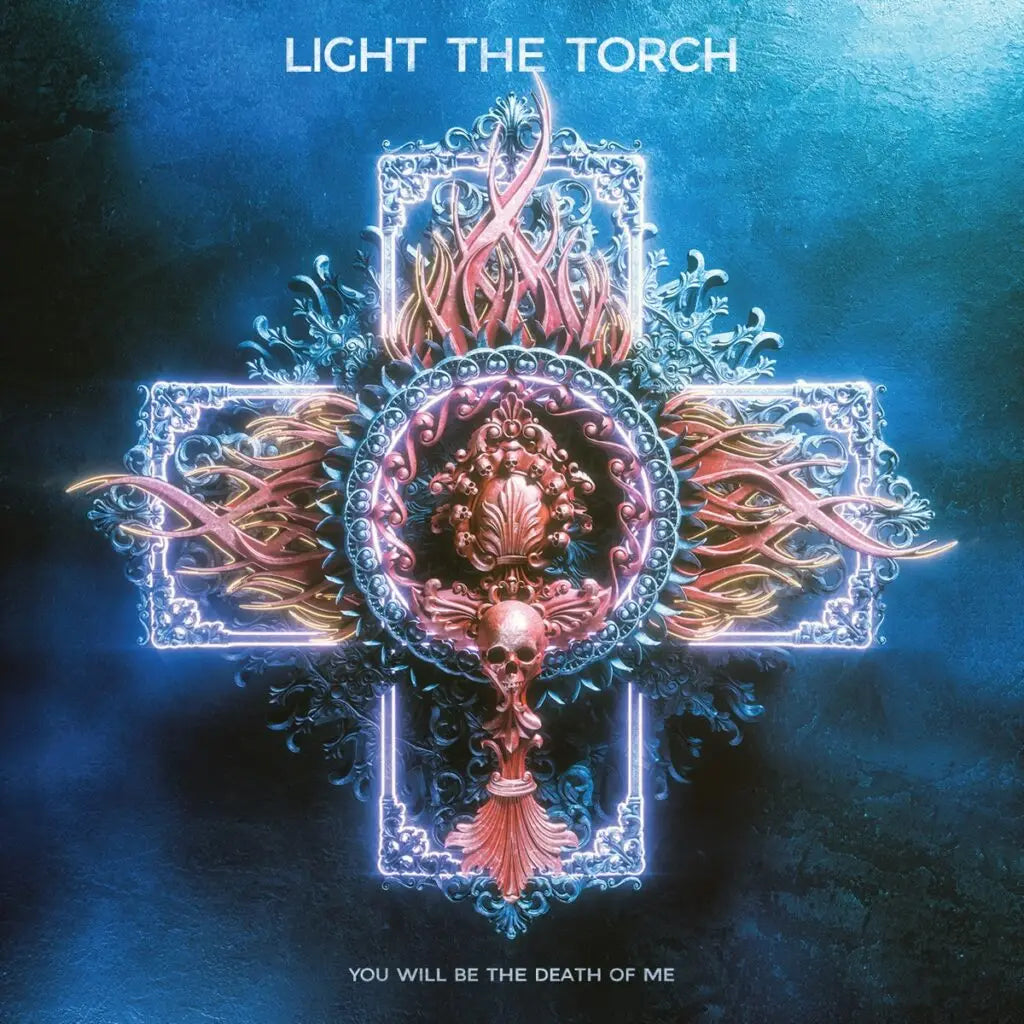One thing is certain with Howard Jones – it’s go big or go home. He treats every song as a platform to express himself to the max. The last time I saw him onstage it was August 2018 at the O2 Arena in London. His former band, Killswitch Engage, were supporting Iron Maiden and invited him up to guest on “The End of Heartache” – the title track of the first album he sang on for them in 2004 and one that helped make his name in the wider metal scene.
That night, his rich, sonorous voice filled the half-full arena with ease. Seeing him perform the vaulting leaps of the opening verse just felt right. The truth is, there are very few frontmen in metal who emote onstage and on record like Jones. There were pockets of adulation in the crowd seeing him reunited with Killswitch Engage, but I’m not sure what the majority of the audience thought about his imposing presence, with his face partially concealed under a baseball cap, singing his heart out. I looked over the shoulder of a 50-something Iron Maiden fan taking notes for his blog. He had written on his phone that Killswitch Engage were ‘grungy’. I suppose for a certain generation of Iron Maiden fans, any metal music released after 1992’s ‘Fear of the Dark’ sounds that way.
Three years later, Jones is releasing the second album with his band Light the Torch, ‘You Will Be the Death of Me’. Well, really it’s their fourth album: the first two were released under the moniker Devil You Know. They had to change the name after an ex-member claimed rights to it.
The band is a songwriting partnership with guitarist Francesco Artusato and is completed by bassist Ryan Wombacher and, on this album, by drummer Alex Rüdinger. Jones is full of praise for the Whitechapel sticksman and his work ethic. As for Artusato, Jones describes a deluge of ideas being sent his way – material for up to forty songs which they gradually whittled down, largely dictated by whether he was happy with the vocal lines he generated for them.
The new record finds Jones in fine voice. It’s the most melodic album he’s worked on – full of huge hooks and choruses, sparingly offset by his rasping scream. But there is still plenty of juggernaut seven-string-guitar riffing on “End of the World” and “Come Back to the Quicksand”. Lead single “Wilting In the Light” shows that heaviness is deployed in service to the songs, not the other way around.
‘I mean, it’s got some heavy spots in it,’ says Jones of the album. ‘To me it’s just a different way of expressing all that emotion. I’ve been screaming in bands for a long time. So, doing it this way, it’s different. We don’t really have a set rulebook or anything. We just kind of do it, and it’s really so much more enjoyable than I thought it would be.’
During our conversation, Jones often talks about enjoying himself and having fun. This takes him by surprise (‘I sound way more positive than I thought I would!’), maybe because these songs tangle with a lot of darker emotions. The title of the album is drawn from the chorus of “Death of Me” (another one with a massive bridge riff), which alongside “Living With a Ghost” and “Let Me Fall Apart”, depict mutually destructive relationships.
‘Life happened,’ says Jones when I ask him what inspired them. ‘Between everyone in the band and things that happened with the band, these setbacks here and there, and just the things that were happening to us individually, that timeframe was a perfect storm for darkness. So Fran and I, when we started talking about writing the album, just getting direction, it immediately took a dark note. From the first song that he sent me that I wrote to, it was just like, “OK, I think that’s what this album is”. It didn’t feel really forced to be that way. It’s just what happened.’
This ‘perfect storm’ stands in stark contrast with the emancipatory tone of previous album, 2018’s ‘Revival’ – not that you’d know that from a cursory glance at the song titles on that one. The difference suits Jones: ‘I’ve always enjoyed light and dark’.
The best moments of 'You Will Be the Death of Me' examine the tension between lightness and darkness, despair and redemption. Jones has long used quasi-religious themes and motifs in his lyrics to search his soul. Here it is no different on songs like “Become The Martyr”: ‘Pain’s written on your face, and I’m the author’. That song marries moody introspection with a bed of synths that give the album an unusual retro-futurist sheen.
‘Yeah and a lot of that falls into Francesco’s realm,’ says Jones. ‘He’s been really exploring that and he’s just one of those guys I never know where he’s going to go next. And that’s kind of the fun of it. Some of this we plan out but some of it is just how he’s writing at the time and how I’m writing at the time. I’ve been really fortunate to have worked with the people I’ve worked with over the years. He’s unique, and so I’m enjoying this.’

The pain and torment of being in, and out of, love recurs frequently through Jones’s work. I ask him how he’d feel if I said he wrote the best love songs in heavy music: ‘Awkward,’ he replies. ‘I appreciate that, but have to say no, I don’t think like that. I mean, I just try to write what I feel and express it. To me it’s just – I dunno, it’s just something that I still love.’
But the list of his lovelorn material is long. Just a few examples: there’s the title of (his first band) Blood Has Been Shed’s album, ‘I Dwell on Thoughts of You’; the Killswitch Engage songs “The End of Heartache”, “My Curse” and “Still Beats Your Name”; through to “Pull My Heart Out” from ‘Revival’ and “Something Deep Inside” on the new album.
There’s also the audacious closing track of ‘You Will Be the Death of Me’, a cover of “Sign Your Name” by eighties pop icon Terence Trent D’Arby: ‘That to me is part of the fun of an album and it’s giving something a go and trying something a little different,’ says Jones. ‘And I think it was just a really interesting way to end the album.’
Jones professes that the real love comes from him creating and defining something when he writes: ‘I love being able to walk into a studio with nothing and get in there and emote, and sing, and work with my people I’m working with, and just walk out with this thing that represents a little piece of you. It’s like, OK, you walk in with… it’s noise. And then: it makes sense. And I still love that feeling. So for me, I dunno, I still chase that dragon. I love it.’
Jones wears his heart on his sleeve, and he struggles with it too. He has been very open about his mental health troubles in the past: particularly how they severely impacted him during his tenure with Killswitch Engage. The battle against hopelessness is at the centre of his best music. Take the song “Wetwork” from ‘Novella of Uriel’, the second Blood Has Been Shed album from 2001, where he laments, ‘What can I say that has not been said?/ What can I do that has not been done?’
Being able to balance Jones’s urge for creativity and performing, with the toll it can take on him, is a slow process of growth: ‘Just over time, yeah, there’s definitely a bit more balance. It’s just figuring out what works and kind of sticking with it. Everything takes time. I wish this stuff was quick, but it’s not.’
Jones needs to keep busy and keep moving. He describes himself as a ‘nomad’ with multiple bases of operation and also as ‘extremely antisocial’. During the pandemic he has been restless: he gets out and about as much as possible, trying to see what is happening, rather than what he describes as ‘burying myself in sadness’.
Several times in our conversation he talks about the satisfaction of creating art from ‘noise’, and that extends to the hushing of the noise of the world over the last year: ‘the quiet has been amazing’. He describes an unsettled existence which demands he gets obsessed with work as much as possible. Alongside Light the Torch, there is also his project SION, alongside YouTuber Jared Dines. He is very grateful for the freedom of being busy.
I ask him about the other great upheaval of the last year: Black Lives Matter. But he won’t be drawn on it, saying he just wants to focus on the music. As one of heavy music’s most prominent Black musicians I did wonder how the BLM movement had impacted on him and his views on the diversity of the scene. When he first emerged in the late nineties in Blood Has Been Shed alongside other hardcore and metal bands like God Forbid and Candiria, it presented a diverse vanguard of Black musicians, as part of the New Wave Of American Heavy Metal.
But Jones has never been overtly political in his lyric writing. Instead he has traced the trials and emotional tribulation of the everyman figure – spilling his guts on behalf of his audience. In terms of his success and longevity of his career he says he ‘never saw it coming’. I ask what advice he would give the 20-something Howard Jones, from his perspective today aged 50.
He jumps into roleplay:
‘Howard! Letting you know – you’re going to have this crazy experience with bands and everything.’
‘Oh, really?! So what do I do?’
‘I don’t know, man. It’s going to screw you up but you’re going to love it!’
He erupts into laughter.
I tell him about seeing him perform at the O2 with Killswitch Engage in 2018 and ask for his reflections on his time in the band: ‘It’s where I learned how to work. And it’s where I’ve made some lifelong friends and some great memories. It’s also where I learned a lot of the good and bad about me.’
With Light the Torch, Howard Jones is keeping the fire burning from those days. If anything, his way of expressing himself is bolder and more assured. He uses his voice and the band’s lyrics to illuminate the darkness of our times and his own character. For now, he is content stepping out of the shadows once again.
‘You Will Be the Death of Me’ is released 25 June on Nuclear Blast. Pre-order the album - HERE

"More Than Dreaming"
"Let Me Fall Apart"
"End of the World"
"Wilting In the Light"
"Death of Me"
"Living With a Ghost"
"Become the Martyr"
"Something Deep Inside"
"I Hate Myself"
"Denying the Sin"
"Come Back to the Quicksand"
"Sign Your Name"




